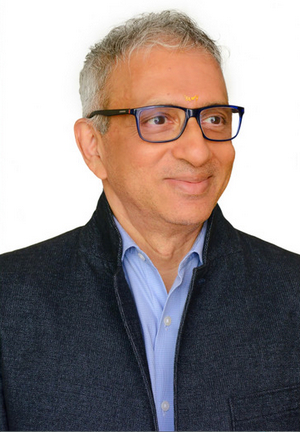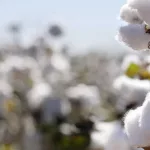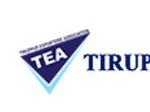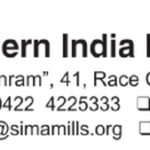
Coimbatore
May 11, 2022
The predominantly cotton based textile industry in India has been performing extremely well immediately after the second wave of COVID pandemic owing to pent up demands that emerged in the post-COVID scenario. The US sanction on Xinjiang province cotton, attractive cotton futures trading and pent-up demand forced the cotton price to reach a record high level in a short span of time. Considerable drop in cotton production from the level of 360 to 330 lakh bales, a record consumption to the tune of 360 lakh bales from the normal level of 290 to 320 lakh bales per year and 11% import duty levied on cotton till 13th April 2022 fueled the situation. The steep increase in cotton price during the peak season has highly benefited the cotton farmers, ginners and traders and major players in these segments started hoarding the seed cotton and lint cotton, leading to speculation of prices. It is estimated that 40 to 50 lakh bales are yet to arrive the market. The traders in India also capitalized MCX and NCDEX platforms to make Indian cotton expensive by 5% to 10% taking advantage of 11% import duty by adopting import parity pricing policy and destabilizing the market.
Consequent to the constant genuine demand by the user industry, the Government has removed the import duty for the period 14th April to 30th September 2022. The Hon’ble Union Minister of Textiles and Secretary, Ministry of Textiles have been conducting series of meetings and monitoring the situation. The Hon’ble Minister of Textiles has again scheduled a meeting on 17th May 2022 to review the situation.

Ravi Sam, Chairman, SIMA
In a Press Release issued here today, Mr. Ravi Sam, Chairman, The Southern India Mills’ Association (SIMA), has appealed to all the stakeholders in the value chain to stand united and adopt win-win strategy to mitigate the grave crisis rather than demanding the Government to take certain short cited policy decisions like banning or imposing quantitative restrictions on cotton and yarn exports that would tarnish the image of the Nation as a reliable supplier in the global market. Mr. Ravi Sam has stated that the spot cotton prices of Gujarat Sankar-6 bench marked variety that prevailed at Rs.76,600 per candy of 355 kgs during the beginning of March 2022, is now ruling at Rs.99,000. The cotton yarn price (40s Red label combed compact hosiery yarn – referred by the downstream sectors as the premium quality yarn sold in Tirupur market) ruled at Rs.411 per kg and is now ruling at Rs.481 per kg. The spinning mills normally use 60% of Shankar-6 variety cotton and 40 % of Telangana Bunny Brahma cotton to achieve high yarn realization of 72%. The clean cotton cost per kg accordingly works out to Rs.376 per kg. Even assuming a very low conversion cost of Rs.1.85 per count per kg with high productivity, reasonable wage cost, Rs.5.85 per unit power cost (as against Rs.7.47 per unit of grid power cost; presuming some captive wind power), nominal interest and depreciation cost, 40s RL yarn cost works out to Rs.502/- per kg with zero profit as against the current price level of Rs.481/- per kg. He has stated that the Association has already appealed to the spinning sector to extend full support to the downstream sectors by shouldering the increase in cotton price to the maximum possible extent.
SIMA Chief has stated that the Indian spinners have contracted over 10 lakh bales after 14th April 2022 as against 5 to 6 lakh bales contracted till 13th April 2022 from the beginning of the season that might reach the mills only by the end of June. Mr. Ravi Sam has felt that cotton price might start getting softened once the imported cotton as well as the summer cotton from States like Tamil Nadu arrive the mills. He has added that the cotton consumption might also drop considerably due to unviability.
Mr. Ravi Sam has cautioned that any negative step or short-sighted policy would cause irreparable damage to the highly capital intensive spinning sector that is already saddled with 35% of spinning machines that are more than 15 years old and it might force the downstream sectors to become import dependent.
SIMA Chairman has urged the Government to strictly enforce the mandatory collection of online statistical returns giving the particulars of production, consumption and stock data across the value chain from ginning to garmenting is the need of the hour to curb speculation and take appropriate policy decisions. He has appealed to all the stakeholders to file the Returns to the Office of the Textile Commissioner so that the industry and the government could have a reliable data to plan any strategy.
Mr. Ravi Sam has urged the Government to launch the Technology Mission on Cotton 2.0 on a war footing as the cotton productivity level that prevailed at 565 kgs per hectare has now dwindled down to 460 kgs and production has dropped from 398 lakh bales to 330 lakh bales. He has pointed out that the scheme is urgently required to protect the livelihoods of 65 lakh farmers and over three crore people directly employed in the cotton textile value chain. He has said that the farmers are struggling with over 1500 uncertified and outdated technology seeds. He has pointed out that the Technology Mission on Cotton that prevailed during 2000 to 2010 and the Bt technology of old versions, had helped the country to become the largest producer of cotton in the world. He has said that in the absence of latest technology seeds like high density planting, drought tolerant, weedicide, etc., poor agronomy research & practices and poor handling of cotton from Farm to Ginning, the entire cotton value chain including the farmers are seriously suffering.
Mr. Ravi Sam has recalled the advice given by the Hon’ble Union Minister of Finance on 9th May 2022 at Coimbatore to the stakeholders, to avoid seeking any demand that might benefit one segment, but affects any other segment in the value chain. Against this background, SIMA Chairman has appealed to all the stakeholders in the cotton value chain to stand united to mitigate the current crisis and urged the Government to launch TMC 2.0 with adequate funds for a permanent solution on the raw material front. He has further said that the industry can appeal to the Government to extend the period of import duty removal beyond 30th September 2022 to tide over the crisis. Such extension would change the market sentiments and would not affect the cotton farmers, as the prices would remain much above the Minimum Support Price.





